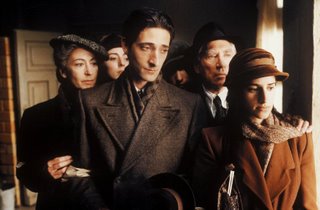
OK, a somewhat late review on an absolutely brilliant film.
The Pianist, released in 2002, is a magnificent movie, and by far, Polanski’s most polished and personal work. Polanski survived the Warsaw ghetto bombings and escaped from the Krakow ghetto by escaping through a fence. This is a very different take on the holocaust. It does not present any particular angle to it, and for the initiated, it may look distinctly un-Polanskisque.
Spoiler warning – Plot details follow:
Casting Adrien Brody in the role of the Polish pianist, Wladyslaw Szpilman, Polanski extracts a wonderfully restrained performance. The film starts with Szpilman playing Chopin on the Polish radio, when a German bomb lands in the studio, creating a ruckus of sorts. Szpilman keeps playing, with the nonchalance of a musician who is perhaps a little detached from reality. This becomes clearer in his altercations with his brother, his lack of understanding of his brother’s jealousy. And he doesn’t come out as a brave person either, opting out of the fledgling ghetto resistance against the German forces. When his family and all its members have been hauled off to the concentration camps, he exhibits no qualms in seeking the help of a freedom fighter and getting away from the problems of the ghetto. The remainder of the movie is a complex mixture of narrow, almost unbelievable escapes as Szpilman moves from house to house, and at the same time, is witness to the gruesome battle between the Nazi machine and the few Jews in the ghetto who would not give in without a fight. Szpilman is almost on the verge of losing his mind and his life when he receives help from the most unlikely quarter, a German officer, who comes upon him as he is trying to open a can of watermelon juice, and keeps him safe and fed for the remainder of the German rule. The movie ends with a beautiful performance of Chopin, by a dapper, recovered pianist for the same Polish radio.
There are several good reasons to see the Pianist. Firstly, it’s a movie shot with relentless eye for detail and an adherence to authenticity rarely seen in holocaust movies. Perhaps, it lacks the emotional touch, because all that Polanski shows is the ruthlessness of the Nazi killing machine with a matter-of-fact, in-your-face approach. Secondly, it’s a movie which is filled with moving pictures about the strength of human resilience. And thirdly, because it’s a fantastic story told in the best way possible.
The pianist is a movie of riveting power and unadulterated sadness at the same time. In the pianist, the concentration camps are never shown. The incarceration and the gas chambers are all off limit. The movie shows violence which was beyond the purview of the concentration camps. Even at the harshest moments in the film, there is rarely an attempt towards an overmuch of sentimentality of crudeness. Even though the tone of the movie is distant, and rarely does Polanski let the view get inside Szpilman’s head, there is never an excess of detachedness which would have marred the spirit of the movie. It’s a very Hitchcock-ish approach to film making, in which by actually tackling the violence and the dread with a sort of dramatic reticence, Polanski actually intensifies the impact rather than reducing it. At no point of time in the movie will the viewer feel an enhanced sense of uplift. Even at the end, when Szpilman is helped by a polished and refined German officer, the context and the material is handled with excellent restraint and pathos. And when Szpilman himself is unable to help the German officer after all of them have been taken in by the Soviets, the movie further exhausts all chances of an uplifting mood.
One of the most poignant scenes in the movie is one which is closely related to Polanski’s personal experience. One evening as Szpilman is still in the ghetto, walking home one evening, he notices a few boys, trying to crawl under the infamous walls, pursued by German guards. He tries desperate to help one of the children who has crawled half way in but is being pummeled by the German guard on the other side. He finally manages to pull him in, but by the time he actually does so, the child has died. It’s a touching statement made by a person who himself escaped form the confines of the Krakow ghetto through a hole in the fencing at the age of seven.
The pianist does have its flaws, like finding a perfectly tuned grand piano in a battered house in the Warsaw Township, as is the exceptionally flawless playing by Szpilman when asked by the German officer. However, those are but minor flaws in an otherwise spellbinding film with awesome performances by almost each and every member of the cast. Shot with solemnity and serenity, the Pianist ranks as one of the finest non-documentary films on the holocaust – probably the deepest stain in the history of the twentieth century.


0 Responses to “The pianist”
Post a Comment